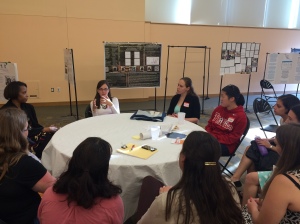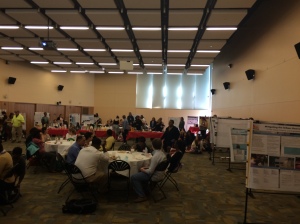“…And if three people do it! Can you imagine three people walkin’ in, singin’ A bar of “Alice’s Restaurant” and walkin’ out? They may think it’s an Organization! And can you imagine fifty people a day? I said FIFTY people a day . . . Walkin’ in, singin’ a bar of “Alice’s Restaurant” and walkin’ out? Friends, They may think it’s a MOVEMENT, and that’s what it is: THE ALICE’S RESTAURANT ANTI-MASSACREE MOVEMENT! “
-Excerpted Lyrics from Arlo Guthrie’s “Alice’s Restaurant”
Six years ago, EdCamp (Wiki Website / Foundation Website) began as a small group of teachers meeting up talk about their practice on a Saturday morning. Today, it’s a genuine movement. In the last 12 months, EdCamps were held at over 300 locations across the world, created and run by teachers that wanted to connect with others, share their struggles, and learn about the next big thing.
 An EdCamp uses an “unconference” model for teachers’ professional development. It turns the idea of traditional professional development upside down. Instead of a pre-selected group of experts telling teachers what to do or think, participants (teachers) decide what to talk about and they run the show. The “experts” are the teachers that have innovated and experimented with their own practice, and can share their insights with others. Sessions are decided upon at the event, and if nobody attends a session, it just doesn’t run. The result: all the sessions are ones that are interesting, useful, and engaging to the participants, and everyone wants to be there. In fact, that is the culture of an EdCamp: stay because you want to, share because you like to, and enjoy the day together. It really does feel like a bit like camp, without the folk songs.
An EdCamp uses an “unconference” model for teachers’ professional development. It turns the idea of traditional professional development upside down. Instead of a pre-selected group of experts telling teachers what to do or think, participants (teachers) decide what to talk about and they run the show. The “experts” are the teachers that have innovated and experimented with their own practice, and can share their insights with others. Sessions are decided upon at the event, and if nobody attends a session, it just doesn’t run. The result: all the sessions are ones that are interesting, useful, and engaging to the participants, and everyone wants to be there. In fact, that is the culture of an EdCamp: stay because you want to, share because you like to, and enjoy the day together. It really does feel like a bit like camp, without the folk songs.
As a teacher educator, I have been fascinated by this movement. Teachers are taking charge of their professional development in a way that has not happened before – and the education industrial complex is starting to listen. Curriculum companies like Harcourt Brace Mifflin regularly send representatives to EdCamps now to learn about what is happening “on the ground.” School districts send administrators. Educational technology companies scour twitter for the next EdCamp to see if they can provide free give-aways to promote their products to these “early adopters.” Traditionally, teachers have been on the receiving end of policy and curriculum – now, they are the makers, and everyone else is rushing to catch up.
I know all this because I decided that, in my fascination with the movement, the best way to learn about EdCamp was to run an Edcamp. So, in April 2015, I and several colleagues organized “EdCamp Next Gen Teachers,” an EdCamp for pre-service as well as inservice teachers. In doing so, I not only got a deeper sense of the natural energy of an EdCamp – I also uncovered tensions between the institutional constraints of teacher education and the unconference model.
The struggle was this: EdCamps work because teachers choose to be there; they self-select into these events based on their interest and personal motivation to learn and connect with others. When you add the element of required attendance, as I did for the pre-service teachers in our EdCamp Next Gen, things become more complicated. Furthermore, there is an enduring ethos of schoolification (which I am constantly challenging, even in higher education) to memorize and regurgitate the “correct” answer, which does not work with the EdCamp model. In EdCamp, no one is told what to do or say; participants decide what they need and what they want to learn.
Needless to day, EdCamp Next Gen took a while to warm up. Some participants just didn’t understand that THEY were the ones deciding what sessions to run, and how to run them. Yet, as the evening wore on, and groups coalesced into solid sessions, a little bit of magic happened. In one room, the Dean of the school was learning from pre-service teachers about their personal experiences in inclusion and what it would mean for them as future teachers. In another room pre-service teachers were hearing about how inservice educators were teaching about #blacklivesmatter. Expertise was re-framed, and interest and innovation pushed participants into deeper levels of thinking and learning than they had experienced in traditional educational programs.
One group of pre-service teachers was particularly engaged in the process. This group had been in a class I had taught the previous semester, in which they had to organize their own mini-version of an unconference. They knew what went into making an EdCamp happen, and the value of the sessions. What I concluded from the EdCamp experience with pre-service teachers was that the discourse and ideology of such a model is something that must be taught and, perhaps most importantly, experienced, in order to overcome the participatory barriers of schoolification and required attendance. Teaching this new approach in teacher education could have longer term implications for the pre-service teachers – if they can experience the power of teacher-led professional development early on, they will be more likely to engage in life-long learning, inquiry, and collaboration in the future.
This is all to say that we have a lot to learn from EdCamps as both a teacher leadership and professional development model for inservice teachers and as a framework for re-thinking teacher education in higher ed institutions. If you haven’t gone to an EdCamp, see if there is one in your local area to attend. If not, start one yourself – the EdCamp foundation is now starting a new “EdCamp in a Box” program to help educators and schools to start an EdCamp easily. Also, please feel free to share your comments below with your experiences, observations, and questions about EdCamp.



Hey Kira! Edcamp wants me to collect blogs about people post about them, and I’m adding this to the list! Thanks!
-Katie